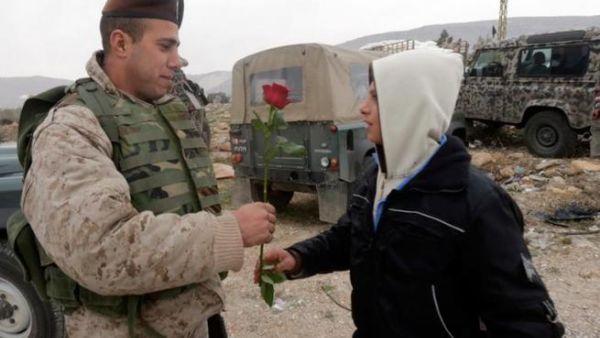The situation in Lebanon’s northern Bekaa Valley is deeply troubling. A few days after the June 11 killing of a man from Ersal in Hermel, four local men were killed on Sunday near the border town of Qaa. Hezbollah is straining to deflect blame from the people of Ersal in order to prevent further strife in a region where Syrian militant groups maintain a heavy presence.
A quadruple murder in Wadi Rafeq, a town located between Qaa and Ras Baalbeck, has nearly plunged the Bekaa into a heated conflict. Unknown assailants ambushed the four men, identified as Mohammed Karama Jaafar, Hussein Ali Jaafar, Sharif Youssef Amhaz, and Ali Haidar (a Turkish citizen whose mother is Lebanese).
The men had come to Wadi Rafeq, a hub for the Syrian diesel black market, to repair a truck owned by the Jaafar clan. According to sources in the clan, the two Jaafar men asked help from Amhaz and Haidar to repair their truck. But when they arrived in Wadi Rafeq, they came under intense fire from an armed group, and were killed instantly in the ambush.
Read more: The latest news from the Middle East
The families of the four men have openly accused Ersal residents of the murder. Some media outlets linked Sunday’s incident with last week’s killing of Ersal resident Ali al-Houjeiri. The Voice of Lebanon Radio even accused a group from Ersal of carrying out the attack to allegedly avenge Houjeiri.
As soon as news of the incident broke out, a unit from the Lebanese army headed to Wadi Rafeq. The unit soon encountered a large number of militants and backed down to “await reinforcements,” according to a security source. By the time the Lebanese army reached the site, the militants had withdrawn.
Reacting to the news, gunmen appeared in several northern Bekaa villages, including the town square of Labweh and the Ersal juncture. Chaos reigned supreme until efforts led by local leaders, including Hezbollah, Amal, and the Lebanese army, contained the situation.
Amal, Hezbollah, and the MPs of the Baalbeck-Hermel district released a statement accusing “hired agents of perpetrating the crime with the aim of instigating sedition in the area under false premises.”
The victims’ families blamed Ersal residents for the murder, specifically its mayor Ali al-Houjeiri and his son, and Sheikh Mustafa al-Houjeiri, the brother of Ali al-Houjeiri.
Ersal’s mayor denied these accusations, and said he was at his son’s wedding. Sheikh Mustafa said, “I don’t know who my foe is. Would I kill innocent people that had nothing to do with my brother’s murder?”
The residents of Ersal issued their own statement denouncing “the massacre that targeted innocent civilians.” They said the attack “was aimed at causing sedition between the people of Ersal and the region.”
Speaking to Al-Akhbar, a prominent figure in Ersal said that the murder “ruined the reconciliation efforts that would have taken place two days from now between the people of Ersal and clans from Hermel.”
Yassin Jaafar, a Jaafar clan elder, told Al-Akhbar in a phone interview, “For the time being, we will let the government carry out its investigations to identify the perpetrators of this massacre.”
Jaafar added, “We will not be hasty. No matter how much time passes, we will find our foe, but we will not be dragged into sedition. We will not be the reason for igniting the country that remains more important than all of us.”








